Does a Restraining Order Go on Your Record?
For individuals wondering, does a restraining order goes on your personal record, a restraining order will only go on your record if it was filed in a criminal court.
 Written by Background Check Repair
Written by Background Check Repair
Criminal Records | April 29, 2024
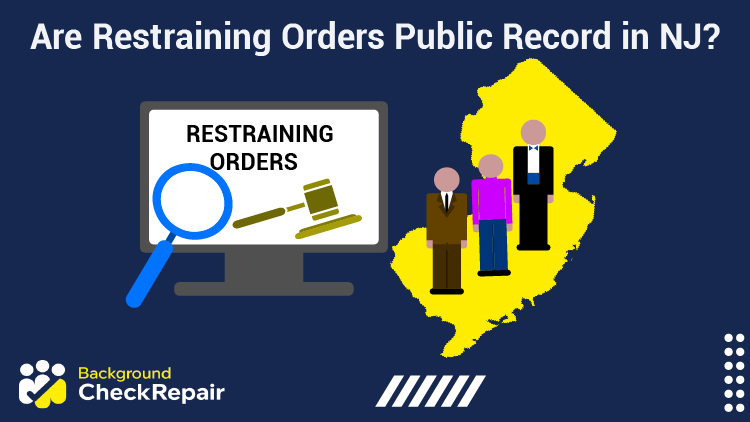
Table of Contents
When asking, are restraining orders public record in NJ, many people may be surprised to learn about the New Jersey Protection Order Search.
Most states file the majority of restraining orders in family or civil courts, which prevents the order from appearing on the individual’s record, and New Jersey is no different in this regard.
However, the state of New Jersey also maintains a central registry of all individuals who have had domestic violence restraining orders, even if those individuals were never convicted in criminal court.
This database is not available to the public and is only used for law enforcement purposes, so the answer to the question, are restraining orders public in NJ is no…unless law enforcement officials or those in the Justice Department are looking.
When asking are restraining orders public record in NJ, the main factor that will decide if the records are likely available to the public is what court the restraining order was filed in.
In most states, including New Jersey, restraining orders are usually a civil issue and are filed in civil courts. This poses several issues when it comes to the records being publicly accessible.
Although the Freedom of Information Act requires that all court records be made publicly available, there are notable exceptions to this that affect how easy it is to obtain information about restraining orders.4
Basically, a judge is able to seal court records if the information within the records would negatively affect the individuals involved and if the information is not in the interest of the public.
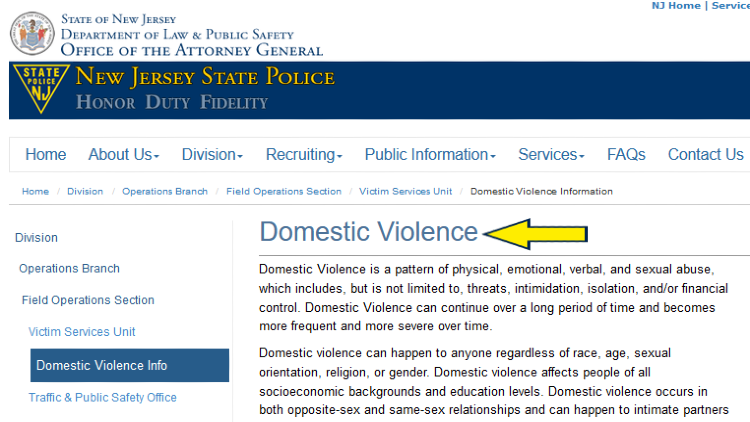
The New Jersey State Police website provides victims services, outlining domestic violence and what qualifies for restraining orders in New Jersey.
Although criminal court information is always considered in the interest of the public, so that individuals can keep track of crime in their communities, civil court information is rarely in the public interest. This means that most civil and family court records will be sealed upon the conclusion of the case.
Since most restraining or protective orders are filed in civil court in New Jersey, then the majority of these records are sealed and are not public records.
However, there is an exception to this. In some cases, a domestic violence charge will be filed in a criminal court.5
If this domestic violence charge also involves a protective order, which they often do, then there will be a public record of the restraining order via the records of the criminal domestic violence charges. How long domestic violence stays on your personal record will depend on the conclusion of the domestic violation charge.
Many individuals have likely heard about the NJ central registry for domestic violence.3
The grounds for restraining order NJ will vary on a case-by-case basis, however, the basic requirement is that there must be a legitimate threat to the safety and well-being of the individual who is filing for a restraining order, known as the petitioner.
Obviously, this definition is somewhat vague, which allows for a fairly broad interpretation. Individuals who are considering filing a restraining order should contact a lawyer to discuss options and if pursuing a protective order is the right move.
In general, a pattern and threats of domestic violence are some of the most common reasons that a judge will grant a protective order.6
General harassment is one of the most common reasons that individuals will seek a restraining order against another individual. But many individuals will still be unsure as to how to prove harassment in NJ.
Once again there is not really a direct answer.
Just like with all court and criminal proceedings, there is no surefire way to get the outcome you are hoping for.
Proving something like harassment in particular can be fairly difficult to prove as there may be a lack of hard evidence. This is one of the main reasons that individuals should contact a lawyer for help with this process.
A lawyer will be able to view the facts of the case and help decide on the best approach to convince a judge that the individual is being harassed and that a restraining order might be necessary.
The process to get a restraining order is somewhat simple, but individuals should know that getting a restraining order is not something that someone simply decided to do. Rather, an individual will need to file for a restraining order and present their reasons for seeking the order in front of a judge.
The judge will then look at the facts of the case and decide if there is cause for a restraining order to be filed against the individual.
When it comes to how to put a restraining order on someone in NJ, the process is fairly simple and can be done without the help of an attorney. The first thing individuals will need to do is to locate and visit the nearest New Jersey family court.8
At the courthouse, individuals will be able to fill out the required form to seek a TRO or Temporary restraining order. In most cases, individuals can expect to have the TRO hearing in front of a judge on the same day that the required form was filed.
At the TRO hearing, the individual will be able to present their case to a judge who will then decide if there is grounds to grant a temporary restraining order. It is important to note that only the petitioner needs to be present at the TRO hearing, the defendant does not need to be present in order for the judge to grant a temporary restraining order.
If the judge elects to grant a TRO, then the restraining order will go into effect immediately and last at least until the full restraining order hearing, which will require testimony from both parties.
When it comes to a restraining order NJ stalking is another common reason that a judge will grant a protective order. However, individuals should be aware of the exact parameters that must be met in order for a behavior to be considered stalking in New Jersey.1
Individuals should always contact a lawyer and discuss the matter if possible.
Getting a restraining order NJ emotional abuse is also possible, although a little bit more difficult.
One of the main reasons that emotional abuse can be difficult to prove is there is a lack of physical evidence in most cases. However, using text messages or email evidence is fairly common in these cases.
Although some states have numerous kinds of restraining orders for different situations and each with its own set of rules, the state of NJ only has two different kinds of restraining orders. The only types of restraining orders in NJ are temporary restraining orders and final restraining orders.
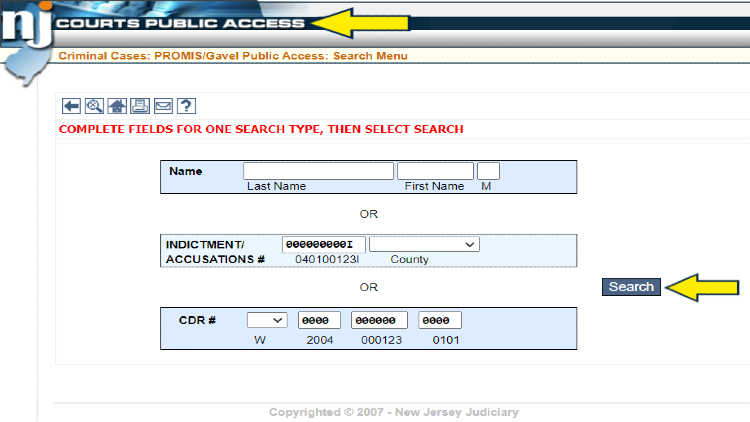
Searching court records, including any public restraining orders, can be done using NJ Courts Public Access portal.
As mentioned, a temporary restraining order is used to protect an individual until the court date when testimony from both sides will be heard. This is similar to someone being arrested and put in jail despite not actually having been convicted yet.
A TRO will usually last about two weeks or at least until the court date.
A final restraining order is what is given at the end of the full hearing for the restraining order. Upon hearing testimony from both sides, a judge will decide if there is sufficient evidence that the defendant intends to harm the petitioner, at which point the judge will file a restraining order against the defendant.
Although many states’ restraining orders will last about 5 years, a New Jersey restraining order can last forever.
When it comes to someone obtaining a final restraining order NJ custody of the individual’s children might be an issue on the individual’s mind. However, custody agreements are not discussed during a restraining order hearing.
Although domestic violence and restraining orders will factor heavily into child custody agreements, these issues will be settled separately in a family court.7
The consequences of a final restraining order in NJ are fairly severe in many cases. Generally, the individual will be fined a fee of $500 and will be added to the New Jersey domestic violence central registry.
Individuals who are on the central registry will also be unable to purchase a firearm for the rest of their lives. All of these consequences are in addition to the defendant not having a contact of any kind with the petitioner until the restraining order is lifted, should this ever occur.
As far as NJ final restraining order requirements are concerned, there are surprisingly few. This is because virtually all restraining orders are granted on a case-by-case basis, so the requirements for a restraining order to be filed will vary based on the unique circumstances.
One of the few requirements is that both individuals will need to be present at the hearing for the final restraining order.
Like all states, NJ has specific rules that must be followed when a restraining order is filed. Luckily, the restraining order NJ rules are fairly simple.
Basically, the judge will decide on the conditions of the order upon hearing testimony from both parties. In many cases, the rules of the restraining order will involve no contact of any kind, no matter the circumstances.
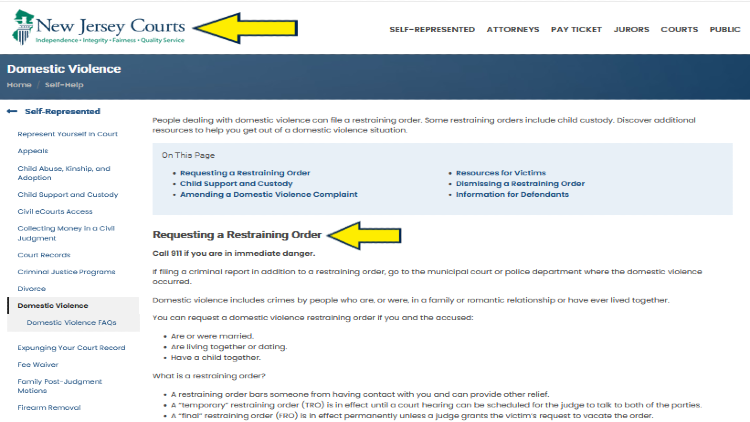
Restraining orders in New Jersey are issued through the courts, and domestic violence is defined on the state website.
However, in certain cases, the order might be less extreme, especially if there are children involved in the situation.
The temporary restraining order NJ court rules are fairly simple. Basically, a TRO will have the same rules as a FRO, usually that the individual the defendant can not contact the petitioner in any way, but instead of lasting forever these rules will only last until the hearing.
\If the FRO is granted then the rules will be reinstated, however, if the order is not granted then all of the active orders will be dismissed and the defendant will legally be allowed to contact the petitioner.
When it comes to a violation of restraining order in NJ, the consequences can be quite severe. In New Jersey, violating a restraining order is considered criminal contempt and is considered either a misdemeanor or a felony based on the circumstances.
Regardless of the charge, the individual will be arrested.
A restraining order violation will affect the question of, are restraining orders public record in NJ, as a restraining order violation involves a criminal charge and will be a public record.
When it comes to how long do restraining orders last in NJ, the answer is fairly straightforward. A temporary restraining order will usually last around two weeks but will always cover the time between the initial restraining order petition and the formal hearing for the final restraining order.
Final restraining orders in New Jersey do not have time limits and can last forever. However, both individuals can petition to have the order lifted.
After hearing that pending charges may appear on a background check, many individuals will be wondering, if a restraining order is dismissed does it go on your record, however, this should not be the case.
As mentioned, Most restraining order cases in NJ are filed in civil court. Whether the order is dismissed or not makes no difference, civil cases are unlikely to appear on an individual’s record.
Many individuals will want to know how to dismiss a restraining order in NJ, unfortunately, the process is fairly difficult and there is no reliable method to get a restraining order dismissed.
Generally, if an order is filed in the first place it is because the petitioner feels that they are in danger. In order to obtain a dismissal, the individual will effectively need to prove that they are not dangerous and pose no legitimate threat to the petitioner.
This is a fairly complicated situation and it is highly recommended that individuals contact an attorney for legal counsel or representation if possible, as this will give them the best chances of having the order dismissed.
When it comes to what to say to the judge to drop the restraining order, it will depend entirely on the circumstances of the case. The same as the petitioner will collect evidence to show the judge that they are in danger, the defendant will need to do the same to prove that they do not present a danger.
In many situations, this can be extremely difficult, especially if there has already been an established pattern of abuse.
Individuals who have petitioned for a restraining order but have since changed their mind might be wondering if can I drop a temporary restraining order before the court, although possible it can be somewhat difficult, given the short amount of time that a TRO is active. Individuals will likely need legal help to get the process done on time, but the process essentially involves filing for the order to be dropped with the court that granted the TRO.
Some individuals who are facing criminal charges might have heard about getting charges dropped is one of the best outcomes for such a scenario and will be wondering how to get charges dismissed before the court date. Unfortunately, there is no reliable way to do so but there are some options worth exploring.
Most cases that are dropped before a court date are dropped due to new evidence coming to light that exonerates the individual of the crime they were accused of, or are dropped due to procedural issues with the arrest or investigation. Getting charges dropped is the best possible outcome and this is what lawyers will pursue if there is a legitimate opportunity.
Individuals will very likely need the help of a defense attorney to get charges dropped.
Individuals who are unsure if their restraining order is going to appear on a background check should perform a restraining order background check on themselves. To learn how to perform a background check on yourself is easy and can be done using the search bar at the top of this page, or by using an online background check service, such as those that offer free trials.
An individual can also perform and learn how to obtain a federal background check on yourself for the most thorough check possible.
Although there is a lot to consider outside of just the public record when it comes to, are restraining orders public record in NJ, the answer is generally no unless the order was filed in a criminal court. In some cases family court records will not be sealed, individuals can always check NJ court records for evidence of a protective order.2
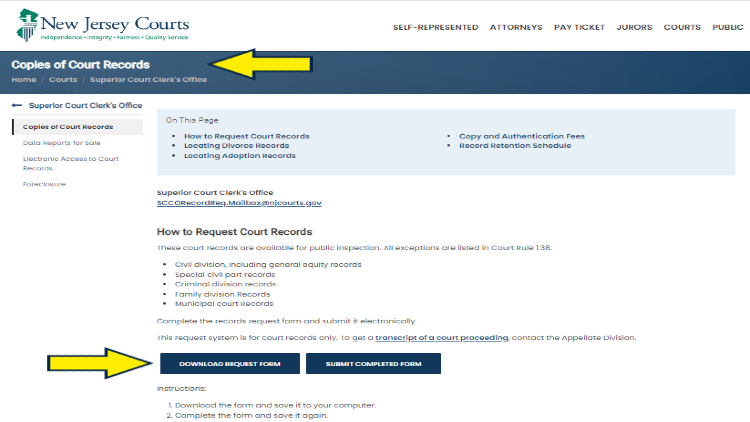
Requesting court records, including NJ restraining orders, can be done online using the state’s request form and submission process.
Facing a restraining order can be a scary situation, especially when you don’t know the full effect it may have on your future.
Researching the protective order process is the first thing individuals should do so that they can have a better understanding of issues like, are restraining orders public record in NJ, and be prepared for the long-term effects it may have.
For individuals wondering, does a restraining order goes on your personal record, a restraining order will only go on your record if it was filed in a criminal court.
Harassment is a legitimate reason to seek a restraining order in New Jersey.
The final restraining order hearing will involve testimony from both parties upon which a judge will decide whether or not to grant the final restraining order.
A restraining order can be dismissed for several reasons, but anything that indicates the individual is not actually in danger can be grounds for dismissal.
Individuals will need to hire an attorney to have the best chance of fighting a restraining order in NJ as the process is fairly complicated and will likely require someone with experience to have the best chance.
A certification to dissolve a restraining order is a document that is usually signed by the original petitioner that will end a restraining order.
1HOLZAPFEL, J. W. (2022, January 18). Bill S849. New Jersey Legislature. Retrieved January 3, 2023, from <https://njleg.state.nj.us/bill-search/2022/S849/bill-text?f=S1000&n=849_I1>
2New Jersey Judiciary. (2023). Copies of Court Records. New Jersey Courts. Retrieved January 3, 2023, from <https://www.njcourts.gov/courts/superior/copies-court-records>
3New Jersey Office of Legislative Services. (2023). 2C :25-34 Domestic violence restraining orders , central registry. New Jersey Legislature. Retrieved January 2, 2023, from <https://lis.njleg.state.nj.us/nxt/gateway.dll/statutes/1/2753/3074?f=templates$fn=document-frameset.htm$q=%5Brank,100%3A%5Bdomain%3A%5Band%3A2C%3A25-34%20Domestic%20violence%20restraining%20orders,%20central%20registry.%5D%5D%20%5Bsum%3A2C%3A25-34%20Domest>
4Office of Information Policy (OIP) U.S. Department of Justice. (2023). The basic function of the Freedom of Information Act is to ensure informed citizens, vital to the functioning of a democratic society. Freedom of Information Act. Retrieved January 2, 2023, from <https://www.foia.gov/>
5State of New Jersey. (2023). Domestic Violence. New Jersey State Police. Retrieved January 2, 2023, from <https://nj.gov/njsp/division/operations/domestic-violence-info.shtml>
6State of New Jersey. (2023). Domestic Violence Court Procedures. The Official Website for the State of New Jersey. Retrieved January 2, 2023, from <https://www.nj.gov/dcf/news/publications/DVCourtProcedures.pdf>
7State of New Jersey. (2023). Resources For Victims Of Domestic Violence. New Jersey Department of Corrections. Retrieved January 3, 2023, from <https://www.state.nj.us/corrections/pages/PHEC.html>
8State of New Jersey. (2023). Superior Court Locations. NJCourts.gov. Retrieved January 3, 2023, from <https://www.njcourts.gov/courts/vicinages/county.html>
We use cookies to ensure that we give you the best experience on our website. If you continue to use this site we will assume that you are happy with it